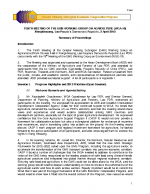The Ninth Meeting of the GMS Working Group on Agriculture (WGA-9) was held in Nanning, Guangxi, People's Republic of China, on 4-6 July 2012, with the theme "Innovative Financing through Public Private Partnership (PPP) for Regional Investment in Low Carbon Agriculture in the GMS". The Meeting was organized and sponsored by the Asian Development Bank (ADB) with the cooperation of the Ministry of Agriculture, PRC, and attended by participants from the six GMS countries (Cambodia, People's Republic of China, Lao PDR, Myanmar, Thailand, and Viet Nam), and ADB.






